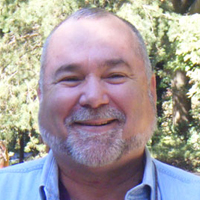
ROBERT STEELE: I have been watching with growing concern as Phi Beta Iota has posted a string of relatively radical posts on the Boston bombing and Texas fertilizer explosion. As most know, I lean toward transparency, truth, and trust, and the last thing I would want to do is marginalize these voices for truth and trust as I have been marginalized these past six years. My focus now that my clearances have been justly reinstated is to get out of town — to find the toughest job in the darkest corner and vanish. Have brain will travel. Having said that, this search is important and merits a broad response that ties everything together in context.
The short answer, if you accept my pioneering concept of the “fifteen slices,” as cleared by CIA and DoD and offered up in Human Intelligence: All Minds, All Languages, All the Time (US Army Strategic Studies Institute, June 2010), is that clandestine Human Intelligence (HUMINT), one of the four secret slices, is 6.6% of the totality of HUMINT and should receive 13.2% of the budget. In my view, HUMINT has failed miserably on two fronts: leveraging Open Source Intelligence (OSINT) for spotting and assessing as well as post-recruitment vetting and validation; and in pointedly questioning the value of the technical disciplines that produce so little — that compare very poorly with HUMINT/OSINT in relation to the investments made and the processing not done.
HUMINT DoD OK with two changes
Here below is the original graphic I created after being interviewed for DISL HUMINT at DIA (not selected or I would be invisible), the central graphic for the above monograph — I post the clearance letters above because there are still too many that fail to understand my deep commitment to doing the right thing.
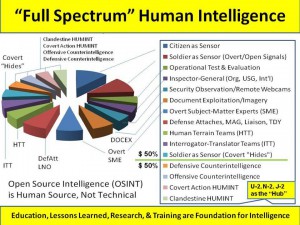
Four of the fifteen slices are classified: Clandestine HUMINT, Covert Action, Offensive Counterintelligence, and Defensive Counterintelligence. This is 26.6% but I clearly show that this quarter of the pie should be spending 50% of the over-all budget for government HUMINT. If we were to place the government HUMINT in the context of the totality of all national human intelligence, as applied to all threats and all policies, it would drop to perhaps 20% of the whole, within which clandestine HUMINT alone would be 1.3% of the totality, with clandestine HUMINT within the government and defensive counterintelligence in the private sector (virtually non-existent) comprising perhaps 5% of the national HUMINT total. Below I show the circles as I see them with my ambition to one day integrate Education, Intelligence, and Research under one Secretary-General for National Intelligence.
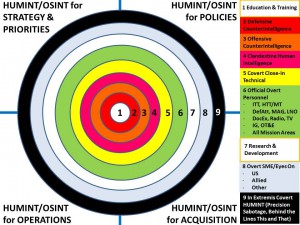
All of this in turn has to acknowledge both the diversity and richness of all that can be known outside of government, and the abject fragmentation that our various forms of moral, intellectual, and organizational corruption have fostered these past many decades. I show each of these in turn, in relation to my vision for a UN/NATO/regional M4IS2 enterprise. 98% of all of this is untapped.
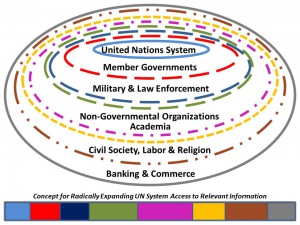
And here is the actual state of scientific knowledge, at a time when real-time science is urgently needed across all of the policy areas, because changes to the earth that used to take 10,000 years now take three or less, and the speed with which genetically-modified toxins and other nano-derivatives can mutate and scale is truly frightening to contemplace.
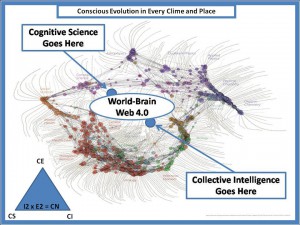
Above, overlain on the web of fragmented knowledge that my colleague Dick Klavans created from citation analytics, is my conceptualized solution, easily spawned with just $15M a year, but best developed within an enduring Open Source Agency (OSA) such as CIA and the rest of the secret world have fought bitterly to repress, knowing full well that within 180 days their entire existence would be called into question in the eyes of the public.
Focusing only on clandestine intelligence while neglecting all else is like having a penis in a jar that you wave around. Disconnected from the larger body of knowledge, it is downright pathetic.
Intelligence is about decision-support. It is about the outputs, not the inputs. As long as the USA remains guilty of Loch Johsnon's “Seven Sins of Strategic Intelligence,” (see also his Seven Sins of American Foreign Policy), clandestine intelligence is a waste of precious human and financial resources that also risks enormous political and social costs — witness the varied forms of idiocy by CIA in Afghanistan and Pakistan, and the terrible costs we are accruing in Africa and elsewhere with extra-judicial “covert” action that is counter-productive by every possible intellectual and moral measure.
Truth is our objective, intelligence is our method. I fear that we will remain unintelligent and incoherent in government until such time as the public takes notice that the Emperor is not just naked, but running down the street killing left and right with wild abandon, violating with impunity the rule of law and the value of informed consent — legitimacy. Only the public can determine the truth — I am reminded of Norman Cousins, in The Pathology of Power, who also outlines the challenge we all face today, against which we are doing so very badly. My summary review of this book, the only review, may be of interest to fellow citizens concerns about our present situation.
“Governments are not built to perceive large truths. Only people can perceive great truths. Governments specialize in small and intermediate truths. They have to be instructed by their people in great truths. And the particular truth in which they need to be instructed today is that new means for meeting the largest problems on earth have to be created.”
“The challenge, therefore, is to recognize that national security depends on a wide range of factors, some of them nonmilitary in nature.”
He goes on to list the freedoms and well-being of the society itself, the focus on making human development the highest national security priority; the selection of creative transformative rather than manipulative leaders; the articulation of national goals that win foreign support on their merits; the strengthening of international institutions; and finally, the recognition that governance must be focused on the common good, not on retaining power. To lead properly is to be free of corruption. Anything else is pathological and undermines national security. In other words, we must have intelligence with integrity in support of ethical evidence-based decision-making. Counter-intelligence within — cleansing ourselves of traitors and thieves in our own ranks, is the first step in restoring the relevance of intelligence to all else.
May God Bless America and keep her, her public servants, and her citizens, safe in these dark times.
Semper Fidelis,
Robert Steele
See Also:
2012 Thomas Briggs on The Human Factor
2012 USA Human Intelligence (HUMINT) Scorecard 1.1
2008 Open Source Intelligence (Strategic) 2.0
DefDog: Human Intelligence (HUMINT) Survey
Graphic: Changing Centers of Gravity for Intelligence in an Open World
Marcus Aurelius: The Pentagon’s New Defense Clandestine Service
Reference: National Intelligence Program (NIP) – and Questions Not Asked
Robert Steele: Clandestine Operations 101 + Personal Comment
Search: humint [Human Intelligence] HUMINT + Meta-RECAP
Thomas Briggs: Reflections on OSINT in Support of HUMINT



